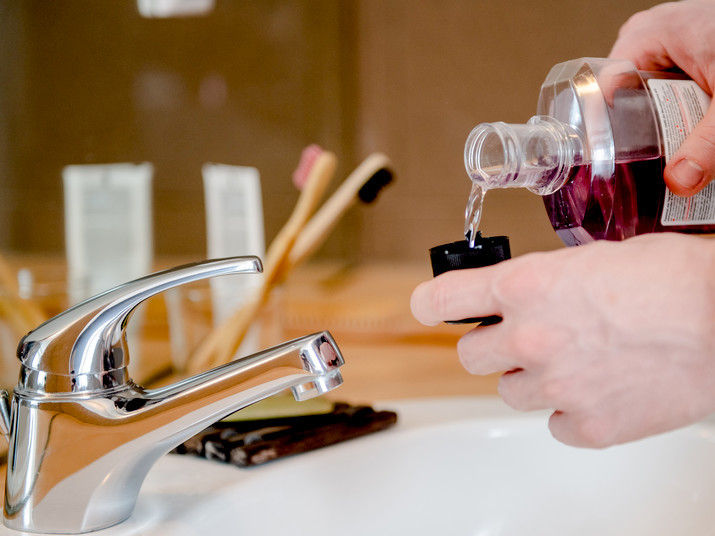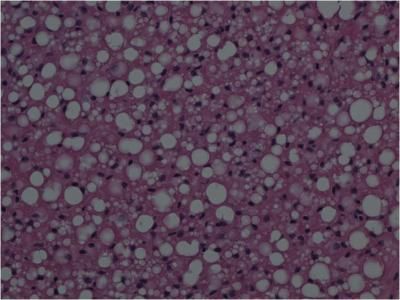Mouthwashes could reduce the risk of coronavirus transmission
Results from cell culture experiments show that commercially available preparations have an effect on Sars-Cov-2 viruses
SARS-CoV-2 viruses can be inactivated using certain commercially available mouthwashes. This was demonstrated in cell culture experiments by virologists from Ruhr-Universität Bochum together with colleagues from Jena, Ulm, Duisburg-Essen, Nuremberg and Bremen. High viral loads can be detected in the oral cavity and throat of some Covid-19 patients. The use of mouthwashes that are effective against Sars-Cov-2 could thus help to reduce the viral load and possibly the risk of coronavirus transmission over the short term. This could be useful, for example, prior to dental treatments. However, mouth rinses are not suitable for treating Covid-19 infections or protecting yourself against catching the virus.

Mouthwashes have an effect on the novel coronavirus.
© RUB, Marquard
The results of the study are described by the team headed by Toni Meister, Professor Stephanie Pfänder and Professor Eike Steinmann from the Bochum-based Molecular and Medical Virology research group in the Journal of Infectious Diseases, published online on 29 July 2020. A review of laboratory results in clinical trials is pending.
Eight mouthwashes in a cell culture test
The researchers tested eight mouthwashes with different ingredients that are available in pharmacies or drugstores in Germany. They mixed each mouthwash with virus particles and an interfering substance, which was intended to recreate the effect of saliva in the mouth. The mixture was then shaken for 30 seconds to simulate the effect of gargling. They then used Vero E6 cells, which are particularly receptive to Sars-Cov-2, to determine the virus titer. In order to assess the efficacy of the mouthwashes, the researchers also treated the virus suspensions with cell culture medium instead of the mouthwash before adding them to the cell culture.
All of the tested preparations reduced the initial virus titer. Three mouthwashes reduced it to such an extent that no virus could be detected after an exposure time of 30 seconds. Whether this effect is confirmed in clinical practice and how long it lasts must be investigated in further studies.
The authors point out that mouthwashes are not suitable for treating Covid-19. “Gargling with a mouthwash cannot inhibit the production of viruses in the cells,” explains Toni Meister, “but could reduce the viral load in the short term where the greatest potential for infection comes from, namely in the oral cavity and throat – and this could be useful in certain situations, such as at the dentist or during the medical care of Covid-19 patients.”
Clinical studies in progress
The Bochum group is examining the possibilities of a clinical study on the efficacy of mouthwashes on Sars-Cov-2 viruses, during which the scientists want to test whether the effect can also be detected in patients and how long it lasts. Similar studies are already underway in San Francisco; the Bochum team is in contact with the American researchers.
Original publication
Toni Luise Meister, Yannick Brüggemann, Daniel Todt, Carina Conzelmann, Janis A. Müller, Rüdiger Groß, Jan Münch, Adalbert Krawczyk, Jörg Steinmann, Jochen Steinmann, Stephanie Pfaender, Eike Steinmann; "Virucidal efficacy of 1 different oral rinses against SARS-CoV-2"; Journal of Infectious Diseases; 2020
Original publication
Toni Luise Meister, Yannick Brüggemann, Daniel Todt, Carina Conzelmann, Janis A. Müller, Rüdiger Groß, Jan Münch, Adalbert Krawczyk, Jörg Steinmann, Jochen Steinmann, Stephanie Pfaender, Eike Steinmann; "Virucidal efficacy of 1 different oral rinses against SARS-CoV-2"; Journal of Infectious Diseases; 2020
Organizations
Other news from the department science

Get the life science industry in your inbox
By submitting this form you agree that LUMITOS AG will send you the newsletter(s) selected above by email. Your data will not be passed on to third parties. Your data will be stored and processed in accordance with our data protection regulations. LUMITOS may contact you by email for the purpose of advertising or market and opinion surveys. You can revoke your consent at any time without giving reasons to LUMITOS AG, Ernst-Augustin-Str. 2, 12489 Berlin, Germany or by e-mail at revoke@lumitos.com with effect for the future. In addition, each email contains a link to unsubscribe from the corresponding newsletter.
Most read news
More news from our other portals
Last viewed contents

Heart hormone helps shape fat metabolism - Sanford-Burnham study shows that the pathway to losing fat is heavily influenced by a hormone produced in the heart
Aphid immune system and bacteria - Study shows how ancient relationship with friendly bacteria shaped aphids' unique immune system
Deutsche Gesellschaft für Klinische Neurophysiologie und funktionelle Bildgebung - Darmstadt, Germany
Silent carriers of malaria are unlikely to develop the disease

Promethera Biosciences S.A./N.V. - Mont-Saint-Guibert, Belgium

Skyray Instrument Inc. - Yushan Zhen, China
Epigenomics AG: PRESEPT Study Subject Enrollment Successfully Completed - Completion of PRESEPT Study and reporting of top-line results expected for early 2010
Common RNA pathway found in ALS and dementia



















































